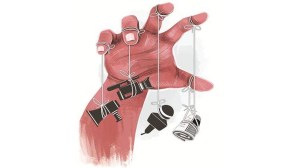Between welfare and weapons
I would not have bothered a bit about the draft Nuclear Doctrine' if it had not been released by the Prime Minister's secretary, Brijesh...

I would not have bothered a bit about the draft Nuclear Doctrine8217; if it had not been released by the Prime Minister8217;s secretary, Brijesh Mishra. The National Security Advisory Board had issued it for 8220;debate and discussion8221; and it should have been treated that way. But Mishra made it official. What it means is that the government has decided to weaponise its nuclear capability, without even building a consensus on the important issue.
Any discussion can modify the programme or do the fine-tuning. But the basic decision cannot be changed. The BJP-led alliance has pushed the nation down the nuclear abyss. How can a caretaker government do such a thing? And what was the hurry unless it was to cash in on the document electorally?
The government has used the board only as a cover. It could easily do so because it appointed on the board such members as were on the same level of hawkishness as the BJP men. The document fits into the thinking of the party or, for that matter, its mentor, the RSS: a militarilystrong and overpowering India reviving the 8220;glory of ancient Bharatvarsh.8221;
The point on which many differ with the BJP is what makes a nation strong: weapons or welfare. A country with nearly two-thirds of its 1,000 million people without any secure means of subsistence cannot be strong, however big its arsenal.
What the doctrine means is that nuclear forces will be based on a triad8217; of nuclear delivery. The army will be equipped with missiles like Prithvi and Agni Prime Minister Atal Behari Vajpayee announced the latter8217;s induction on the Independence Day. In addition, there will be surveillance and other things which the document has not listed.
India will have to spend billions to acquire all this. One estimate is Rs 77,000 crore. Imagine the extent of development if such a large sum could be diverted towards education, health, shelter, water and employment. An advisory board member has defended the expenditure on the ground that it is only 0.7 per cent of GNP a year over the next three decades.Why can8217;t this percentage be allocated to the famished social sector?
A democratic nation has to be fed to stay democratic. The Soviet Union collapsed, not because people demanded individual freedom, which no dictatorship can afford to give, but because the state could not bear the burden of the ever-growing expenditure on the military machine. Moscow had less and less money to meet more and more demands for betterment of the people8217;s conditions. Apparently, the programme the BJP has in view is not to attend to the basic needs of the people, but to spend money on nuclear weapons. More and more currency notes will be printed, resulting in higher and higher inflation.
The doctrine, if implemented, may push the country to a dangerous situation. This may evoke resentment which may find a violent expression. This is already happening to some extent. By siphoning thousands of crores for weaponising from the already small national kitty, the government may mortgage the future of several generations. When drivento the wall, as they will be, people will become more desperate.
Indira Gandhi imposed the Emergency 1975-77 when she could not make good the promise to banish poverty. She found she could not govern through normal laws. So she suspended the Constitution. The BJP men have themselves suffered during the Emergency. They should know what authoritarian rule entails because they may not have any recourse to meet hunger marches.
When the first atomic bomb was thrown on Hiroshima, Mahatma Gandhi said: 8220;The moral to be legitimately drawn from the supreme tragedy of the bomb is that it will not be destroyed by counter-bombs even as violence cannot be by counter-violence. Mankind has to get out of violence only through non-violence. Hatred can be overcome only by love.8221; The nation is already divided over the bomb. To make nuclear capability operational is not a matter which should have been raised in the midst of elections.
After the Kargil incursion, the nation has felt insecure and exposed. The doctrine,which creates the illusion that India is a mighty nation, caters to the fears that Islamabad8217;s aggression has raised. But is Pakistan a real danger? Islamabad8217;s economic plight is such that it cannot afford to compete with New Delhi. If it were to do so, it might destroy itself in the process. Former Pakistan chief of army staff Mirza Aslam Beg is quite right to advise his government not to take part in the nuclear arms race with India. 8220;Whatever capability we wanted to acquire, we have,8221; he said.
The doctrine will also revive the cold war psychosis which India has condemned all along. When the government exploded the bomb, Foreign Minister Jaswant Singh promised that India would not 8220;reinvent the doctrines of the cold war.8221; What else will the doctrine8217; do? Nuclear powers have been moving towards an understanding whereby they can reduce nuclear weapons and stop the proliferation. India8217;s programme, thus, creates a new situation.China may revise its stance, especially when the doctrine is meant for itsconsumption. The missile programme, which Beijing has more or less frozen, may be taken up again in a big way. Will a US-Soviet-type cold war now develop between India and China on the same lines? More and more weapons will be produced to allay the fear that the other side has become stronger. A stage may reach when both India and China will be carrying nuclear bombs in their planes, one fearing a surprise attack from the other.
True, the doctrine promises that India will adhere to its no-first-use policy. But nowhere has the document asked for total disarmament, which all previous governments in Delhi had advocated. The doctrine should have, in fact, laid down a deadline by which time all nuclear powers would destroy nuclear weapons. Not that they would have agreed to the suggestion, but the doctrine would then not have sounded as war-like as it does at present.
And what about deterrence? How far do we go to satisfy ourselves that it is adequate or significant? The doctrine puts the onus on othercountries. This means that the need will expand on the basis of perceived threats. Even Washington has conceded that India has to have some deterrence because of its security needs. But the step which New Delhi wants to take is the one which the nuclear powers are themselves seeking to retrace. It is tragic that we are becoming jingoistic when the international community is realising that destructive weapons do not solve any problem.
- 01
- 02
- 03
- 04
- 05































